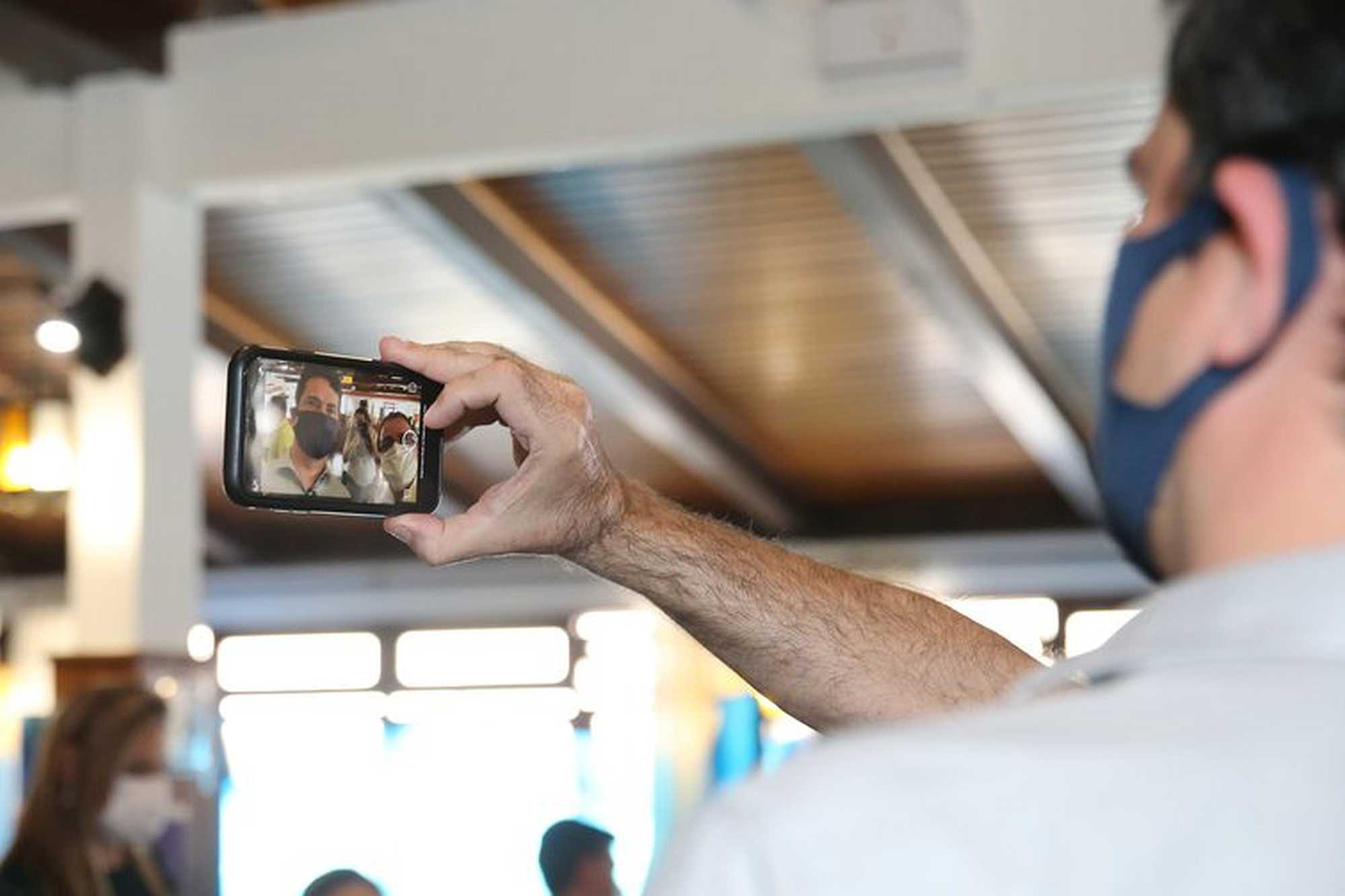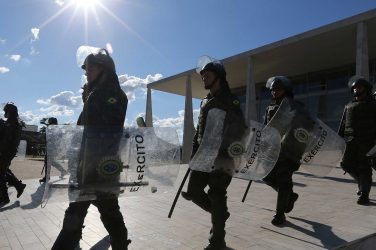Many Brazilians were worried by the torrent of disinformation on social networks during this year’s bitterly contested U.S. presidential elections. This is because they face similar challenges during their own municipal elections this month.
These elections, though local, are consequential: With 5,570 municipalities in Brazil — including key cities such as São Paulo and Rio de Janeiro — the results could shape the political landscape for the presidential contest in 2022.
Just like Americans did, Brazilians are voting in the midst of a devastating pandemic, ruinous economic crisis, and a tsunami of digital propaganda.
Brazil’s first round of elections on November 15, at least, was an improvement: There was less digital propaganda and disinformation than during the more controversial presidential campaign in October 2018. Despite expectations of a wave of far-right victories, just 14 of the 58 candidates backed by Brazilian President Jair Bolsonaro were elected last week.
While some ex-army and police officers clinched office, voters overwhelmingly supported more moderate and center-right politicians, including a record-breaking number of women and transgender candidates. One reason for the lack of digital sparks this time around is because public institutions and social media platforms took steps to mitigate fake news, hate speech and defamation.
With Brazil preparing for the second round of elections on Nov. 29 — including a runoff election in bitterly contested Rio de Janeiro — the country is not out of the woods just yet. Earlier this month, the Superior Court of Justice suffered a massive cyber-attack. The hack on the eve of the elections triggered rumors across social media that the municipal election was rigged and electronic voting machines were flawed.
The most popular hashtag on the day of first-round voting was #fraudesnaseleicoes (election fraud) and #votoimpressoja (vote on paper). There was also a sharp increase in misinformation on Twitter, much of it alleging systematic fraud. Echoing the Republican disinformation campaign surrounding the U.S. presidential election, these allegations are likely to grow in the coming weeks.
Brazil is not just Latin America’s largest democracy, it is a major social media power. Approximately 140 million of the country’s 212 million citizens are regular social media users. Nearly two thirds of the population is on Facebook and around one third of Brazilians use Instagram.
Brazil is also among the top five countries by user count on Twitter and Youtube, and TikTok subscriptions are surging. In Brazil, as other countries, elections are profoundly influenced by what goes on in cyberspace. Most political candidates are active users of social media across multiple platforms. Brazilian opinions are increasingly shaped online.
The 2018 presidential elections were rife with misinformation and deepened political fault-lines in Brazil both online and off. Waves of social media campaigns on Facebook and bulk mailings on encrypted tools like WhatsApp were deeply polarizing.
Brazilians quickly splintered into several camps including hard core supporters of Bolsonaro and a dispersed opposition spanning the center and left. Like-minded groups are still isolated from one another online, but the government’s failure to manage COVID-19 may have helped push the population to the center.
Social media is the dominant battlespace in which politicians mobilize their digital mobs for political advantage. In Rio de Janeiro, during the first round of the elections, incumbent mayor Marcelo Crivella, who is supported by the president, frequently used social media to attack his rivals including Eduardo Paes, a former mayor.
Crivella and Bolsonaro are adept at mobilizing their followers to the cause: Between Oct. 9 and Oct. 21, there were roughly 3,400 posts defaming Paes on Facebook, in public groups, and on verified profiles. These posts generated over 1 million interactions and 4.2 million views. Crivella and Eduardo Paes are now competing in the second round on Nov. 29.
Meanwhile, in São Paulo, right wing mayoral candidate Celso Russomano’s campaign shared a video on WhatsApp falsely accusing leftwing candidate Guilherme Boulos of being responsible for the collapse of an irregularly occupied building several years earlier.
It didn’t seem to help him — Russomano lost to Boulos in the first round, despite support from Bolsonaro. According to the fact-checking agency Aos Fatos, of the 44,052 Facebook posts related to municipal elections during the last week of October, 4,675 were considered “fake” and 2,492 of those were posts attacking Boulos.
While digital disinformation is widespread, this does not mean that it is tolerated. After reports emerged of widespread abuse on Facebook and WhatsApp during the 2018 presidential elections, the Brazilian state intervened.
Specifically, an inquiry committee of the Brazilian Parliament exposed a so-called “hate cabinet” overseen by Carlos Bolsonaro. The hate cabinet allegedly oversaw a sprawling network of fake news channels, right-wing blogs and social media profiles aggressively spreading disinformation and threatening opponents, including via Facebook, Instagram, Youtube and WhatsApp.
Predictably, targets of the hate cabinet included left-wing journalists, opposition politicians, outspoken artists, and independent media outlets critical of Bolsonaro and his inner circle. A parallel investigation was also launched by the Brazilian Federal Police to uncover who was responsible for organizing and financing demonstrations against the Brazilian Supreme Court.
Again, the president’s son and several aides close to the president were singled out as the likely culprits. Investigations are ongoing and several financial backers of these campaigns are being identified.
Another important actor has been the Superior Electoral Court, which last year launched a program to fight disinformation in the 2020 election. The program includes partnerships with at least 48 public and private institutions, social media platforms, and fact-checking groups.
Supreme Court Justice Louis Roberto Barroso who presides over the Electoral Court is personally backing the program. Facebook, Instagram, TikTok, Twitter and WhatsApp have all signed agreements designed to increase direct reporting channels to the TSE, raise awareness about disinformation and misinformation among users, and improve the digital literacy of electoral justice staff. These same platforms also say they have increased content moderation to limit fake news and propaganda on their networks.
While promising, these measures can only be the start of a meaningful strategy to diminish the digital malfeasance undermining democracy, not just in Brazil. This is because digital warfare is moving to new channels, especially encrypted ones.
After WhatsApp introduced rules reducing the number of messages that can be bulk-shared, another encrypted messaging network Telegram — which has yet to sign any agreement with the Superior Electoral Court — is now regarded by experts as one of the principal vectors for extreme right-wing content in Brazil. There are also signs of fake news being trial-ballooned in video platforms such as Youtube before spreading further afield.
Control measures cannot be piecemeal: They need to counter misinformation, extremist content, and cyberattacks at the same time. Most efforts to take down offensive content are done voluntarily by social media platforms, but as the Brazilian case shows, there is a risk that the technology companies will not do enough, or that some of them outright refuse to play ball.
Likewise, fringe platforms beyond the major social networks and messaging apps also require attention since they can also accelerate the diffusion of misinformation. To meet the challenge, governments need to introduce rules that force and incentivize cooperation and punish those companies that refuse.
Social media companies, too, will need to carefully upgrade their content removal policies. Failure to do so is not just dangerous for this year’s elections in Brazil and the United States, it is lethal for democracy all over the world.
Robert Muggah is the co-founder of the Igarapé Institute and the SecDev Group.
Pedro Augusto P. Francisco is a senior researcher at the Igarapé Institute, working in the area of Cyber Security and Digital Freedoms. He holds a PhD and a Master’s degree in Cultural Anthropology from the Institute of Philosophy and Social Sciences of UFRJ, and a Bachelor’s degree in Law from IBMEC.
Louise Marie Hurel leads research and cyberpolicy engagement at Igarapé Institute’s Cybersecurity and Digital Liberties Program, which includes, but is not restricted to projects related to the implementation of monitoring technologies for public security, IoT, and national cyber capacity building.
This article appeared originally in Open Democracy – https://www.opendemocracy.net/














